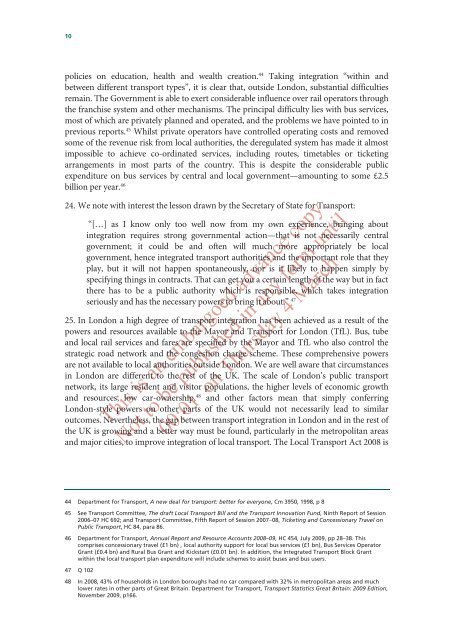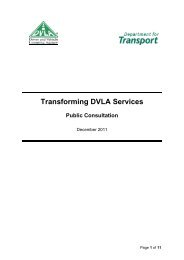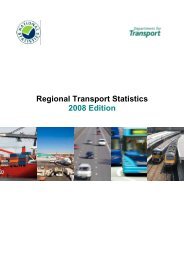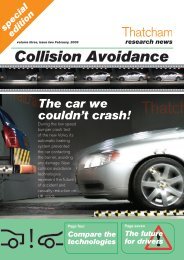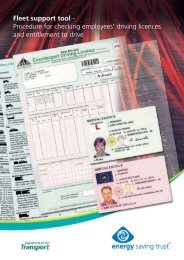The performance of the Department for Transport - Fleet News
The performance of the Department for Transport - Fleet News
The performance of the Department for Transport - Fleet News
You also want an ePaper? Increase the reach of your titles
YUMPU automatically turns print PDFs into web optimized ePapers that Google loves.
10policies on education, health and wealth creation. 44 Taking integration “within andbetween different transport types”, it is clear that, outside London, substantial difficultiesremain. <strong>The</strong> Government is able to exert considerable influence over rail operators through<strong>the</strong> franchise system and o<strong>the</strong>r mechanisms. <strong>The</strong> principal difficulty lies with bus services,most <strong>of</strong> which are privately planned and operated, and <strong>the</strong> problems we have pointed to inprevious reports. 45 Whilst private operators have controlled operating costs and removedsome <strong>of</strong> <strong>the</strong> revenue risk from local authorities, <strong>the</strong> deregulated system has made it almostimpossible to achieve co-ordinated services, including routes, timetables or ticketingarrangements in most parts <strong>of</strong> <strong>the</strong> country. This is despite <strong>the</strong> considerable publicexpenditure on bus services by central and local government—amounting to some £2.5billion per year. 4624. We note with interest <strong>the</strong> lesson drawn by <strong>the</strong> Secretary <strong>of</strong> State <strong>for</strong> <strong>Transport</strong>:“[…] as I know only too well now from my own experience, bringing aboutintegration requires strong governmental action—that is not necessarily centralgovernment; it could be and <strong>of</strong>ten will much more appropriately be localgovernment, hence integrated transport authorities and <strong>the</strong> important role that <strong>the</strong>yplay, but it will not happen spontaneously, nor is it likely to happen simply byspecifying things in contracts. That can get you a certain length <strong>of</strong> <strong>the</strong> way but in fact<strong>the</strong>re has to be a public authority which is responsible, which takes integrationseriously and has <strong>the</strong> necessary powers to bring it about.” 4725. In London a high degree <strong>of</strong> transport integration has been achieved as a result <strong>of</strong> <strong>the</strong>powers and resources available to <strong>the</strong> Mayor and <strong>Transport</strong> <strong>for</strong> London (TfL). Bus, tubeand local rail services and fares are specified by <strong>the</strong> Mayor and TfL who also control <strong>the</strong>strategic road network and <strong>the</strong> congestion charge scheme. <strong>The</strong>se comprehensive powersare not available to local authorities outside London. We are well aware that circumstancesin London are different to <strong>the</strong> rest <strong>of</strong> <strong>the</strong> UK. <strong>The</strong> scale <strong>of</strong> London’s public transportnetwork, its large resident and visitor populations, <strong>the</strong> higher levels <strong>of</strong> economic growthand resources, low car-ownership, 48 and o<strong>the</strong>r factors mean that simply conferringLondon-style powers on o<strong>the</strong>r parts <strong>of</strong> <strong>the</strong> UK would not necessarily lead to similaroutcomes. Never<strong>the</strong>less, <strong>the</strong> gap between transport integration in London and in <strong>the</strong> rest <strong>of</strong>This is an embargoed advance copy.Not to be published in any <strong>for</strong>m until00:01 on Thursday 4 March<strong>the</strong> UK is growing and a better way must be found, particularly in <strong>the</strong> metropolitan areasand major cities, to improve integration <strong>of</strong> local transport. <strong>The</strong> Local <strong>Transport</strong> Act 2008 is44 <strong>Department</strong> <strong>for</strong> <strong>Transport</strong>, A new deal <strong>for</strong> transport: better <strong>for</strong> everyone, Cm 3950, 1998, p 845 See <strong>Transport</strong> Committee, <strong>The</strong> draft Local <strong>Transport</strong> Bill and <strong>the</strong> <strong>Transport</strong> Innovation Fund, Ninth Report <strong>of</strong> Session2006–07 HC 692; and <strong>Transport</strong> Committee, Fifth Report <strong>of</strong> Session 2007−08, Ticketing and Concessionary Travel onPublic <strong>Transport</strong>, HC 84, para 86.46 <strong>Department</strong> <strong>for</strong> <strong>Transport</strong>, Annual Report and Resource Accounts 2008–09, HC 454, July 2009, pp 28–38. Thiscomprises concessionary travel (£1 bn) , local authority support <strong>for</strong> local bus services (£1 bn), Bus Services OperatorGrant (£0.4 bn) and Rural Bus Grant and Kickstart (£0.01 bn). In addition, <strong>the</strong> Integrated <strong>Transport</strong> Block Grantwithin <strong>the</strong> local transport plan expenditure will include schemes to assist buses and bus users.47 Q 10248 In 2008, 43% <strong>of</strong> households in London boroughs had no car compared with 32% in metropolitan areas and muchlower rates in o<strong>the</strong>r parts <strong>of</strong> Great Britain. <strong>Department</strong> <strong>for</strong> <strong>Transport</strong>, <strong>Transport</strong> Statistics Great Britain: 2009 Edition,November 2009, p166.


